 Image search results - "Railways" Image search results - "Railways" |

Seibu Ikebukuro Line train station entrance at Ikebukuro, Tokyo. It takes about 90 min. from Ikebukuro to Yokoze Station via Tokkyu express train. Cheaper trains take 2 hours.
|
|

Ohmi Railways Toyosato Station. MAP
|
|

Inside Toyosato Station.
|
|
|
|
|
|
|

Toyosato Station platform.
|
|
|
|
|

Ohmi Railways Amago Station, Kora town's only train station. It is parallel to the shinkansen bullet train tracks on the left.
|
|

Ohmi Railways Amago Station platform. The station building (community house) can be seen ahead on the left.
|
|

The Amago Station building is called the Amago Community House. Built in Nov. 2003, it's still quite new, but looks under used.
|
|

Entering Ohmi Railways Amago Station which is also a community house.
|
|

Inside Ohmi Railways Amago Station
|
|

Ohmi Railways Amago Station front view. 尼子駅
|
|

Ohmi Railways Amago Station side view
|
|
|

Ohmi Railways Echigawa Station. The station building, named Ruburu Echigawa, has a tourist information counter and exhibition gallery.
|
|

Ohmi Railways Echigawa Station platform.
|
|

Ohmi Railways Echigawa Station platform.
|
|

Ohmi Railways train at Echigawa Station.
|
|

Parallel to Echigawa Station is the elevated shinkansen tracks.
|
|

Ohmi Railways Echigawa Station
|
|

Ohmi Railways Echigawa Station platform.
|
|

Railway crossing
|
|

Ohmi Railway track
|
|

Ohmi Railway track
|
|

Ohmi Railways Museum at Hikone Station east exit.
|
|

Ohmi Railways trains on display
|
|
|
|

Inside Ohmi Railways Museum, a pantographThis museum in Hikone closed and reopened inside Yokaichi Station in Higashi-Omi.
|
|

Ohmi Railways Museum display panels
|
|

Inside Ohmi Railways Museum, rail gauges.
|
|
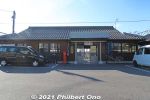
Ohmi Railways Hino Station building was completey renovated in 2017. Very impressive job. Other structures were also renovated including a small railway museum. Renovations were completed by May 2020. 近江鉄道 日野駅
|
|
|
|
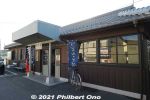
The building is now earthquake-resistant and painted dark brown. It now has a community space for a cafe, tourist information, and waiting room for passengers.
|
|
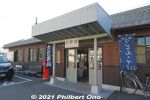
The canopy over the entrance was also renovated. It is supported by entasis columns.
|
|
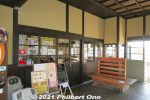
Hino Station's entrance hall. Not so many seats here, but there are benches on the platform. You can also wait inside the cafe on the left.
|
|
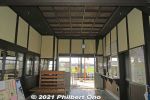
The ticket window used to be on the left corner. Now it's in the right corner. The exit goes to the train platform. The latticed ceiling came from the station's VIP room which was on the right side of the building.
|
|

Ticket window on the right (closed).
|
|
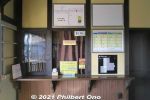
Ticket window (closed). This is new.
|
|
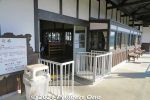
Turnstile
|
|
|
|
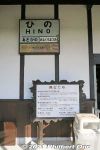
Old Hino Station sign has been in use since the Showa Period (ended in 1989). Displayed on train platform No. 1.
|
|
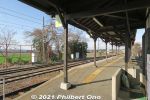
Hino Station train platform.
|
|

On Hino Station's train platform No. 1. Original wooden columns still usable are retained.
|
|
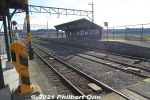
Hino Station has three sets of railway tracks, very rare. The unused middle track is vintage, made by Barrow Steel from the UK. Train platform No. 2 (for Yokaichi/Maibara) across the tracks has a roofed benches also renovated.
|
|
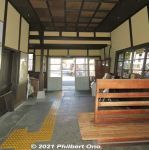
Entering the train building from the platform. Exit ahead.
|
|

Nanairo cafe menu.
|
|
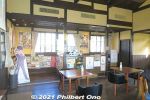
Hino Station now has a nice community space named "Nanairo" that serves as a cafe, tourist information space, and waiting room for passengers. Tourist pamphlets are on the left.
|
|
|
|
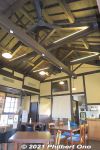
Nanairo cafe has a Western-style truss ceiling from the Taisho Period.
|
|

Friendly ladies wait on you for the food or drink. The clock seen on the right was actually used in the train station office.
|
|
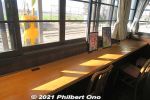
Counter seating has a view of the train platform.
|
|
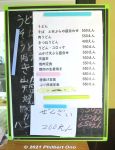
Cafe menu. Low prices. Udon, soba, and teishoku complete meals.
|
|

My teishoku lunch.
|
|
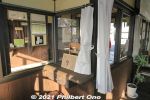
Old ticket window and counter have been retained.
|
|
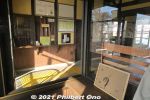
Old ticket window.
|
|
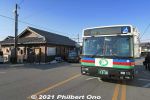
Outside the station is the bus stop for Omi-Hachiman Station.
|
|
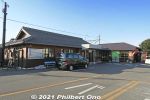
Hino Station (left) and the smaller building on the right used to be the tourist information office. It's now the Hino Station Railway Museum. 日野駅と日野駅鉄道資料展示室
|
|
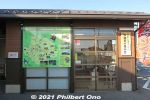
Hino Station Railway Museum. 日野駅鉄道資料展示室
|
|
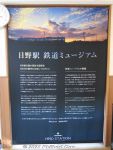
About the entire Hino Station being a "Railway Museum."
|
|

Inside Hino Station Railway Museum. History of the station on panels, and old train and station-related artifacts. No English captions.
|
|
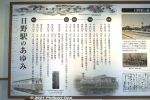
Chronology of the history of Ohmi Railways (founded in 1896) and Hino Station (first built in 1900).
|
|
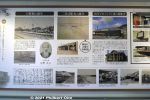
Upper left is a photo of Hino Station's opening day. The back of the station building can be seen. The building was rebuilt in 1916.
|
|
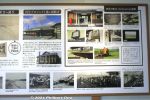
Remnants of the old days still remaining in the renovated Hino Station.
|
|
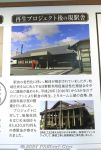
During the renovation, the entire train station building was jacked up to reinforce the foundation against earthquakes.
|
|
|
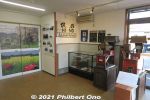
Many of the old artifacts on display can only be recognized or understood by hardcore train fans and people who worked at a train station. It's quite specialized.
|
|
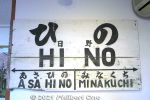
Old Hino Station signage.
|
|
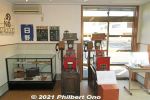
The red instruments are signalling block instruments for preventing collisions between trains. (タブレット閉塞器)
|
|

Implements used by Hino Station staff. Lower left is a paper ticket holder. Preprinted tickets were organized according to the destination.
|
|

L-R: Holder for rubber date stamps used to stamp the date on the ticket. Dating machine to imprint the date on the ticket. Clippers to cutout a small square on the ticket when boarding the train. Magneto telephone with a crank.
|
|
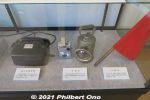
Magneto telephone with a crank (磁石式電話機), signal light, and red signal flag to signal the train.
|
|

On the left are old flyers advertising local businesses in Hino while mentioning Hino Station. Lower right is a roof ornament that has the old crest of Ohmi Railways.
|
|

Ad for a shipping company in front of Hino Station.
|
|
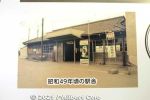
Hino Station in 1974.
|
|
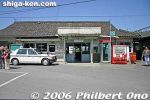
This is what Hino Station looked like before it was renovated in 2019. This old train station building was built in 1916.
|
|

Hino Station on the Ohmi Tetsudo railway before the building was renovated in 2019. On the right was the tourist info office. 近江鉄道 日野駅
|
|
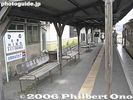
Hino Station platform on the Ohmi Testudo railway. 近江鉄道 日野駅
|
|

Inside Hino Station at night before the building was renovated in 2019. 日野駅
|
|

Hino Station platform at night. Old roof was replaced in 2019.
|
|
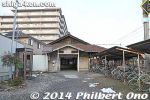
Hikoneguchi Station on the Ohmi Railways. This station building was torn down in Aug. 2014. 彦根口駅
|
|
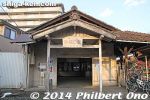
Hikoneguchi Station on the Ohmi Railways first opened in 1901 and renamed Hikoneguchi in 1917. This station building was torn down in Aug. 2014. 彦根口
|
|
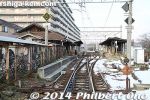
Hikoneguchi Station.
|
|
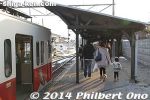
Hikoneguchi Station platform.
|
|
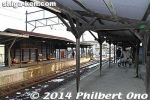
Hikoneguchi Station platform.
|
|
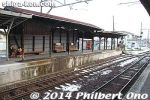
Hikoneguchi Station platform for Kibukawa.
|
|
|
|
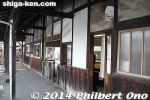
Hikoneguchi Station building before the building was torn down in Aug. 2014.
|
|
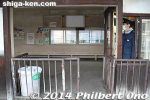
Old Hikoneguchi Station turnstile.
|
|

Inside Hikoneguchi Station before the building was torn down in Aug. 2014. No replacement.
|
|
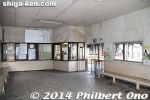
Inside Hikoneguchi Station with turnstile visible, before the building was torn down in Aug. 2014.
|
|
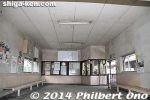
Inside Hikoneguchi Station with turnstile visible, before the building was torn down in Aug. 2014.
|
|
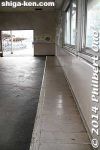
Long bench inside Hikoneguchi Station before the building was torn down in Aug. 2014.
|
|
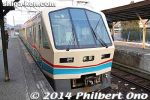
Train for Maibara at Ohmi Railways Hikoneguchi Station.
|
|
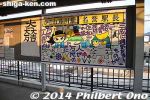
Hikone Serikawa Station. ひこね芹川駅
|
|
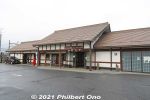
Ohmi Railways Taga Taisha-mae Station. The shrine is a 10-min. walk from this station. 近江鉄道 多賀大社前駅 MAP
|
|
|
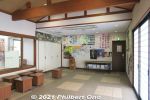
Exhibition space inside Taga Taisha-mae Station. Also good as a waiting room.
|
|
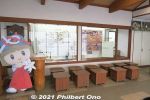
Taga Taisha-mae Station's waiting room also has a showcase
|
|
|
|
|
|

Bicycles are allowed on Ohmi Railways trains.
|
|
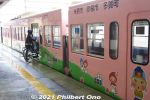
Loading a bicycle on the train.
|
|
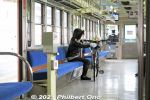
Bicycles are allowed on Ohmi Railways trains.
|
|

Torii near the train station.
|
|
|

Ohmi Railways Taga Taisha-mae Station. The shrine is a 10-min. walk from this station. 近江鉄道 多賀大社前駅
|
|

Exhibition space inside Taga Taisha-mae Station. Also good as a waiting room.
|
|
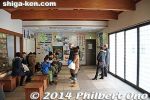
When there's no exhibition inside Taga Taisha-mae Station, it's a nice waiting room.
|
|
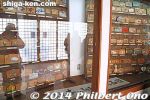
Taga Taisha-mae Station's waiting room also has a showcase of ema prayer tablets from various shrines.
|
|
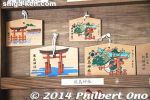
Taga Taisha-mae Station's waiting room also has a showcase of ema prayer tablets from various shrines.
|
|

Taga Taisha-mae Station platform and Ohmi Railways train.
|
|

Inside Ohmi Railways train.
|
|

On the ceiling of Taga Taisha-mae Station, there are sparrow (or are they swallows?) bird nests. This one had chicks waiting for its mother.
|
|

Here's the mother flying in to feed her young.
|
|

This was in May, and these birds often make nests in train station and even public restrooms where people often come and go. The people protect them from predators such as crows. And their nests are too high for people to reach.
|
|

Some kind of new monument in front of the train station.
|
|

Ohmi Railways Yokaichi Station. A modern ferro-concrete building was completed in June 1998 to replace the old wooden building.
|
|

Ohmi Railways Yokaichi Station 近江鉄道八日市駅
|
|

Mural at Ohmi Railways Yokaichi Station
|
|

Chokotto bus ちょこっとバス
|
|
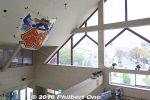
Yokaichi Station always has a large kite decoration.
|
|

Large kite in Yokaichi Station.
|
|

A kite hangs inside the airy pyramid roof of the station building.
|
|

View from station window. The area in front of the station is now lined with shops like Heiwado department store.
|
|
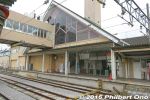
Overpass to station building.
|
|

Ohmi Railways train at Yokaichi Station.
|
|

Kite decoration on mailbox outside the station.
|
|
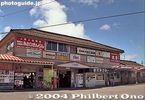
Old Yokaichi Station. My first picture of Yokaichi, before this old station was torn down in 1997. I had to change trains at Yokaichi Station on the Omi Railway Line and had time to step out and take this picture. 旧八日市駅It was a small station, but the wooden building looked quite charming. There was nothing in front of the station, just a large paved area. A far cry from what it looks like today. Power/telephone lines are also underground, making the streets look clean and attractive.
|
|
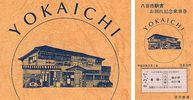
The Yokaichi Station building was replaced by a new building in 1998. March 1, 1997 was the last day when the old station building was used before it was torn down. Omi Railways issued this commemorative ticket to mark the occasion.The drawing of the station and my photograph look almost exactly the same. The same advertising and billboards are on the building. Even the vending machines on the left are pictured in both.
|
|

Shin-Yokaichi Station on the Ohmi Railway, the stop before Yokaichi Station terminal.
|
|

Shin-Yokaichi Station on the Ohmi Railway, the stop before Yokaichi Station terminal.
|
|

Train going to Omi-Hachiman from Shin-Yokaichi Station.
|
|

Shin-Yokaichi Station is a Western-style, two-story wooden building built in 1913. The second floor is closed to the public due to old age. It originally housed the Konan Railway company’s head office (湖南鉄道).
|
|

Konan Railway originally operated the railway between Yokaichi and Omi-Hachiman before it merged with another company that later merged with Ohmi Railways.
|
|
|
|

Tourists don’t normally get off at this station since most attractions are at the next stop, Yokaichi Station.
|
|
|
|
|

Toilet
|
|

Turnstile
|
|

Inside Shin-Yokaichi Station.
|
|

Love the inside of Shin-Yokaichi Station.
|
|

Train ticket window is manned only in the mroning.
|
|
|

Waiting room inside Shin-Yokaichi Station.
|
|
|
|

I wonder how old these benches are. Older than my mom perhaps.
|
|
|
|

Ceiling light.
|
|
|
|
|
|
|
|

Wish we could go up to the 2nd floor.
|
|
|
|

Shin-Yokaichi Station looks brown from the sides, but it's green on the front.
|
|
|

Amazing that this station is still being used. I figure its days are numbered though.
|
|

Roof needs repair.
|
|

Looks like no one will repair this building.
|
|
|

Nature trying to reclaim its place.
|
|

Signs of age in many places, but it adds to the rustic charm.
|
|
|
|
|
|
|
|
|
|
|
|
|
|
|
|
|
|
|

Hirata Station on the Ohmi Railways.
|
|
|
|